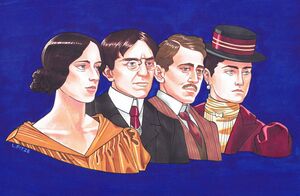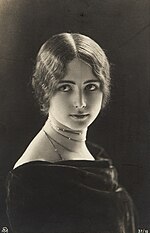Orthodox Republicanism: Difference between revisions
(→Edvárdism: Minor change to last sentence to add in Edvárdian Principles.) |
(Added details to the third paragraph.) |
||
| Line 6: | Line 6: | ||
Orthodox Republicanism was first formulated in 1909 by then university student [[Aldona Szczepański]] and political theory professor [[Krzysztof Baczyński]] during the [[Second Political Odrodzenie]]. Historians categorize this stage of early Orthodox Republicanism to be an evolutionary branch of [[Common Good Government]]. Orthodox Republicanism as it was defined by Baczyński worked off the basis of political ideas promogulated during the [[First Political Odrodzenie]] that emphasized social freedom and libery, as well as ideas of {{wpl|secularism}} and the abolition of nobility within the country. This was precipitated by the [[Coronation of Casimir VI]] in the same year and the re-establishment of the [[Second Vistulzkan Empire]]. Baczyński would invite political theorists [[Béla Edvárd]] and [[Yulia Tymoshenko]], involving them with the formal development of Orthodox Republicanism. The group is titled by historians as the [[Ortho Vanguards]], as part of the larger {{wpl|political faction}} known as the [[New Era Republicans]]. The four collaborated and published the ''[[Testament of the States]]'' in 1912, the seminal work that served as the political and ideological basis for Orthodox Republicanism. It was defined by the ideas of {{wpl|progressivism|social progress}}, {{wpl|nationalism}}, {{wpl|anti-imperialism|anti-colonialism}}, and {{wpl|Workers' self-management|autonomous labor management}} with a government operating under the principles of a {{wpl|democratic republic}} which served with the intention of acting as a [[Public stewardship|public steward]]. The ideology rejected many of the social ideas that were considered to part of the {{wpl|right-wing}}, including in ideologies such as [[Combinationalism]] despite drawing parallels on government operation. | Orthodox Republicanism was first formulated in 1909 by then university student [[Aldona Szczepański]] and political theory professor [[Krzysztof Baczyński]] during the [[Second Political Odrodzenie]]. Historians categorize this stage of early Orthodox Republicanism to be an evolutionary branch of [[Common Good Government]]. Orthodox Republicanism as it was defined by Baczyński worked off the basis of political ideas promogulated during the [[First Political Odrodzenie]] that emphasized social freedom and libery, as well as ideas of {{wpl|secularism}} and the abolition of nobility within the country. This was precipitated by the [[Coronation of Casimir VI]] in the same year and the re-establishment of the [[Second Vistulzkan Empire]]. Baczyński would invite political theorists [[Béla Edvárd]] and [[Yulia Tymoshenko]], involving them with the formal development of Orthodox Republicanism. The group is titled by historians as the [[Ortho Vanguards]], as part of the larger {{wpl|political faction}} known as the [[New Era Republicans]]. The four collaborated and published the ''[[Testament of the States]]'' in 1912, the seminal work that served as the political and ideological basis for Orthodox Republicanism. It was defined by the ideas of {{wpl|progressivism|social progress}}, {{wpl|nationalism}}, {{wpl|anti-imperialism|anti-colonialism}}, and {{wpl|Workers' self-management|autonomous labor management}} with a government operating under the principles of a {{wpl|democratic republic}} which served with the intention of acting as a [[Public stewardship|public steward]]. The ideology rejected many of the social ideas that were considered to part of the {{wpl|right-wing}}, including in ideologies such as [[Combinationalism]] despite drawing parallels on government operation. | ||
Orthodox Republicanism was further developed and expanded upon with the publication of ''[[Humanity and Individualism]]'', which was primarily written by Szczepański. | Orthodox Republicanism was further developed and expanded upon with the publication of ''[[Humanity and Individualism]]'', which was primarily written by Szczepański. The book pushed the ideology closer to the right economically. Szczepański sought to distance Orthodox Republicanism from rising {{wpl|socialist}} and [[Delarueism|Delarueist]] ideologies. She believed that there was more common ground to be established with other right-leaning ideologies such as [[Combinationalism]], at least on an economic level. ''Humanity and Individualism'' sought to define some of the boundaries of where the {{wpl|individualism|individual}} and its {{wpl|human rights|individual rights}} must be guaranteed and protected by the state, and which point where the state must intervene or where the state can disregard certain rights. Szczepański distanced the ideology greatly from any form of {{wpl|anarchism}}, something she viewed with particular distain. She promoted the idea that the central state and the balance of its powers was pivotal from preventing a [[Redivergene event|Redivergence from occuring]], in which a state either degrades its democratic values for autocratic values or the state's power is too weak that it causes a collapse of societal order. Political theorists have often compared Orthodox Republicanism as a {{wpl|centre-left politics|centre-left}} comparison to Combinationalism that focused on some form of {{wpl|centralization}}. | ||
Orthodox Republicanism approached its modern form with the publication of ''[[Manifesto of the New Republican Movement]]'' in 1926, which was primarily written by Edvárd with contributions from the other New Era Vanguards. It also contained additional contributions and essays from other important Orthodox Republicans, including [[Bartholomew Kovalenko]], [[Fidél Égető]], [[Krzysztof Gogacz]], [[Natalia Herashchenko]], and [[Piroska Rickl]]. Orthodox Republicanism became the dominant ideology with [[Edvárdism]] being the most influential school of thought. | Orthodox Republicanism approached its modern form with the publication of ''[[Manifesto of the New Republican Movement]]'' in 1926, which was primarily written by Edvárd with contributions from the other New Era Vanguards. It also contained additional contributions and essays from other important Orthodox Republicans, including [[Bartholomew Kovalenko]], [[Fidél Égető]], [[Krzysztof Gogacz]], [[Natalia Herashchenko]], and [[Piroska Rickl]]. Orthodox Republicanism became the dominant ideology with [[Edvárdism]] being the most influential school of thought. | ||
Revision as of 01:33, 31 December 2024
This article is incomplete because it is pending further input from participants, or it is a work-in-progress by one author. Please comment on this article's talk page to share your input, comments and questions. Note: To contribute to this article, you may need to seek help from the author(s) of this page. |

| Part of a series on |
| Orthodox Republicanism |
|---|
 |
Orthodox Republicanism (Viswe: Prawosławny Republikanizm; Hetumogye: Ortodox Republikanizmus; Prykordonnyan: православний республіканізм) is a political, philosophical and economic ideology within the broader New Republican movement, characterized by the creation of an Orthodox Republic, a government system that is dedicated towards the advancement of the goals of individuals that regards social reform as its primary tool of social advancement. An Orthodox Republic primarily focuses on the promotion of human rights and social justice, while economically is considered to be centre-left. In its original form, it was considered to be closer to economic socialism. Since 1910 however, it has since trended towards a form of democratic capitalism that still has some elements of socialism that trend towards catering towards improvements in quality of life for the individual. Ideologically, it's governing structure is similar to that of a liberal democracy. It is the governing ideology of the New Republican Coalition and the Orthodox Republic of Vistulzka
Orthodox Republicanism was first formulated in 1909 by then university student Aldona Szczepański and political theory professor Krzysztof Baczyński during the Second Political Odrodzenie. Historians categorize this stage of early Orthodox Republicanism to be an evolutionary branch of Common Good Government. Orthodox Republicanism as it was defined by Baczyński worked off the basis of political ideas promogulated during the First Political Odrodzenie that emphasized social freedom and libery, as well as ideas of secularism and the abolition of nobility within the country. This was precipitated by the Coronation of Casimir VI in the same year and the re-establishment of the Second Vistulzkan Empire. Baczyński would invite political theorists Béla Edvárd and Yulia Tymoshenko, involving them with the formal development of Orthodox Republicanism. The group is titled by historians as the Ortho Vanguards, as part of the larger political faction known as the New Era Republicans. The four collaborated and published the Testament of the States in 1912, the seminal work that served as the political and ideological basis for Orthodox Republicanism. It was defined by the ideas of social progress, nationalism, anti-colonialism, and autonomous labor management with a government operating under the principles of a democratic republic which served with the intention of acting as a public steward. The ideology rejected many of the social ideas that were considered to part of the right-wing, including in ideologies such as Combinationalism despite drawing parallels on government operation.
Orthodox Republicanism was further developed and expanded upon with the publication of Humanity and Individualism, which was primarily written by Szczepański. The book pushed the ideology closer to the right economically. Szczepański sought to distance Orthodox Republicanism from rising socialist and Delarueist ideologies. She believed that there was more common ground to be established with other right-leaning ideologies such as Combinationalism, at least on an economic level. Humanity and Individualism sought to define some of the boundaries of where the individual and its individual rights must be guaranteed and protected by the state, and which point where the state must intervene or where the state can disregard certain rights. Szczepański distanced the ideology greatly from any form of anarchism, something she viewed with particular distain. She promoted the idea that the central state and the balance of its powers was pivotal from preventing a Redivergence from occuring, in which a state either degrades its democratic values for autocratic values or the state's power is too weak that it causes a collapse of societal order. Political theorists have often compared Orthodox Republicanism as a centre-left comparison to Combinationalism that focused on some form of centralization.
Orthodox Republicanism approached its modern form with the publication of Manifesto of the New Republican Movement in 1926, which was primarily written by Edvárd with contributions from the other New Era Vanguards. It also contained additional contributions and essays from other important Orthodox Republicans, including Bartholomew Kovalenko, Fidél Égető, Krzysztof Gogacz, Natalia Herashchenko, and Piroska Rickl. Orthodox Republicanism became the dominant ideology with Edvárdism being the most influential school of thought.
Following the Vistulzkan Civil War, Orthodox Republicanism began to branch out as many of the original founding members wrote independent manuscripts and manifestos as to the definition of Orthodox Republicanism, often conflicting with each other. Aldonism, Edvárdism, Baczyńskism, and Tymoshenkoism were the characterizations of the different ideological views based on their independent manuscripts. The most predominant of these ideologies was Edvárdism, where many of his ideals were adopted by the Orthodox Republican Party during the Civil War. Kovalenkoism was the developments of Orthodox Republicanism under the 1st President of Vistulzka Bartholomew Kovalenko. Root Orthodoxy is the basis of Orthodox Republicanism that strictly describes the formulation of the ideology as it was in Testament of the States.
History
Second Political Odrodzenie
Orthodox Republicanism first developed in 1909 admist the Second Political Odrodzenie. During this time, the Coronation of Casimir IV and the reorganization of the country from the Second Noble Republic of Vistulzka into the Second Vistulzkan Empire caused various other radical political groups and ideologies to emerge. New and emerging social aspects of Vistulzka primed the country as the Young Vistlan, a form of literature focused on coffeehouses in Vistla encouraged meetings between political theorists.
Theory
Edvárdism
Edvárdism is the political theory of Orthodox Republicanism that was developed by Béla Edvárd and is derived from his political work, both published and unpublished. They are considered to be the earliest form of modern social progressive politics and is considered to be the most influentual school of thought within Orthodox Republicans. Edvárd did not write many articles or work in detail on economic policies, however was deeply invested in ideas on the social question and thought introspectively on the interactions between the human condition and related philosophies with politics.
Edvárd championed ideas such as individual rights, women's rights, LGBT rights and advocated for secularism. Edvárd and Szczepański often worked juxtaposed on issues of how to achieve their slated goals. Edvárd advocated a system known as Edvárdian Principles, in which that the instatement of democratic principles under the guidance of individual wellbeing that social, political and economic change is achievable.
Aldonism
Aldonism is the political theory of Orthodox Republicanism that was developed by Aldona Szczepański and is derived from her political work. Szczepański's work is considered to be a consequentialist interpretation of the achievement of goals of the Orthodox Republicanism. Her work also focused less on the achievement of certain social goals and considered some Edvárdian principles to be expendible at the sake of establishing efficient economic systems. Her work focused heavily on economic politics. Her most poignant idea that originated from the Testament of the States is Szczepański's Paradox, her refutation of Edvárd's democratic principles being able to achieve any social reform. Within Szczepański's Paradox, she theorized that within a free democratic society, democratic principles are inevitably bound to fail and be abandoned. Once the democratic principles are abandoned, free people will gravitate towards either a fully centralized state that abandons economic liberty and social freedoms or towards a form of anarcho-capitalism. She believed that free society has and will always be in a free fall cycle between democracy, autocratic centralization and full societal destabilization.

